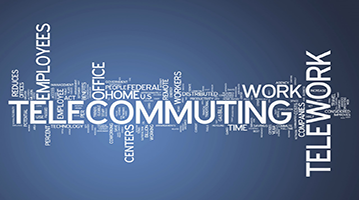
Cybersecurity Risks of Telecommuting
Recently many workers have started teleworking full time due to COVID-19. Since the COVID-19 lockdown, most parts of the world have been undergoing frequent lockdown and more people than ever before are working from home. Though initially it was a temporary setup the organizations resorted to, now more more organizations are allowing employees to work from home on a permanent basis proved that their tasks can be accomplished remotely.
Rather than traveling and working on fixed office space, the Telecommuting employees intend on executing tasks through various channels like online chat programs, telephone, video conferencing, emails, etc. With so many options available the employees don’t need to visit the office regularly. The pandemic is also forcing and diverting many forms of investments towards the industries where telecommuting is possible.
Organizations must find ways to protect their valuable information from being compromised.
Security risks involved with Telecommuting:
Although telecommuting comes with a lot of benefits for the employees but working outside the main office can result in compromising the security of the company or organization. At these current times of the COVID-19 crisis, various kinds of hackers have been trying to find company secrets, and once they get a hold of the data, they end up stealing or corrupting the files of the organization. There might also be a danger where someone might be recording your user ID and password as you type them. Organizations must find ways to protect their valuable information from being compromised.
Some of the potential security risks involved in Telecommuting are:
- Family members using the same PC/Laptop: All the computers involved in the business should have only one user, i.e. the employee. The chances of PCs being infected by malicious software would be more if more people have access to the same computer. Sensitive information might also get leaked or shared due to this.
- Using a work computer as a personal computer: Using a work computer for playing games or shopping can be a great threat to an organization. Visiting certain restricted websites and installing unauthorized software on work PC can cause great damage too.
- Unsecured wireless connection: Using the internet in an unsecured network can bring a lot of risks onto the work PC/ laptop. Work devices should always be used in the home network.
- Backing up PC outside the company network: Storing commercial business data and information should on commercial backup drives or hard drives can result in data leaks including sensitive information.
- Altering administrative settings or security settings: These settings strictly function under companies’ norms and messing with these settings can put the information at high risk.
- Sharing Company data with non-employees: People are often very distracting and nosy and they may keep looking for the things on the work PC of an employee and sharing sensitive information with a non-employee can possess a great threat.
How to take precautions:
- Discuss and check with the employer: One should keep in mind the potential risks and discuss any kind of concerns with their employer. Also, checking the execution of best practices must be followed. Experts suggest using ‘two-factor authentication’ processes which will function as an extra layer of protection for the company as well as the employee.
- Strengthening the passwords: Strong passwords always ensure that systems are well protected and they also reduce the chances of being hacked. Also, a secure data network must be maintained for both, business and personal accounts.
- Taking care of Smartphones: Employees must always keep their smartphones with themselves. Employees that are part of virtual or distributed teams must make sure that the data storage rules are being followed strictly.
- Staying Vigilant: The ability to work at home or any places other than fixed office places has been one of the biggest advances in technology. Although the working atmosphere becomes quite relaxing that doesn’t mean that one should let his/ her guard down. One should always be updated and ready to take measures to prevent any kind of cyber-attacks.
Conclusion:
Telecommuting has been one of the biggest changes in the way we work. It has many more advantages as compared to the risks. But since this process relies heavily on the internet, therefore one must create awareness and educate everyone about cybersecurity. This would be the first step towards protection from Telecommuting risks. One should also focus on password management and software updates. Monitoring the anti-malware software and keeping in check about spams would also help a lot. VPNs must be always used as an added layer of protection. Preparing for cybersecurity risks in advance and backing up information on the cloud can create a huge barrier between the cyber attackers and the organization.
